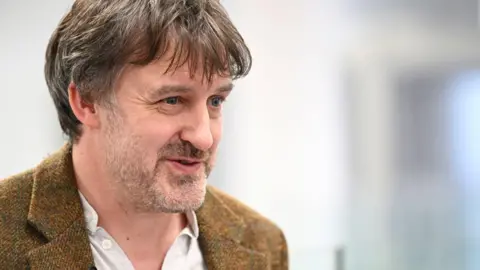First Gaelic poet appointed Scotland's Makar
The first Gaelic poet has been appointed as Scotland's Makar.
Lewis-born Peter Mackay says he is keen to use his new role as the national poet to champion his native tongue, but not at the expense of other languages.
He told BBC Scotland News: "I write mainly in Gaelic and English, and sometimes Scots.
"We are a multi-lingual nation so it's important to find ways to speak to each other."
The original makars were medieval poets or bards, often tied to the royal court and expected to make work for significant occasion.
For the past two decades, Scottish cities have appointed their own makars and in 2004 the first national poet was appointed.
Authorised by the Scottish Parliament, the first poet to be appointed was Edwin Morgan, followed by Liz Lochhead, Jackie Kay and Kathleen Jamie.
Despite concerns the title might be misunderstood outside Scotland, each successive appointment has continued to be known as a makar.
Dr Mackay agrees.
He said: "One of the great things about being the Makar is making.
"I want to bring as many groups together as possible and talk to each other in as many languages as we can about the things that matter like climate change and the refugee crisis."
 PA Media
PA MediaDr Mackay, who lectures at the University of St Andrews and regularly takes part in spoken word events around Scotland, is also concerned about the uncertainty of funding for the arts.
He said he would be monitoring the draft budget announcement closely and is ready to speak up about the importance of investing in the sector.
And while his title - with a stipend from the Scottish Poetry Library - will require a small number of commissions for significant Scottish occasions, he is keen to write on a wide range of subjects.
He said: "Poetry is one of the most private artforms but it's also one of the most public.
"You turn to it when you have births, deaths, marriages and funerals, but poetry can also set the scene in sounds and syllables as well as words."
His first poem performed after being announced as Scots Makar at Edinburgh Central Library was a case in point.
Written for the recent Push the Boat Out Festival in Edinburgh, it is entitled Bourach - a word used in Scots English and Gaelic meaning a muddle, mess, confusion or fuss.
He hoped readers - and listeners - would be able to enjoy the poetry whether they understand the language or not.
"One of the ways I taught myself Spanish was by memorising the poems of Pablo Neruda and carrying them around in my head before I actually understood them," he said.
"The ability to have a poem inside your head, the words inside your mouth changes the way you look at the world."
'Gaelic city'
While he is not limiting his languages, he remains passionate about his native tongue.
Dr Mackay was delighted by the welcome he was given by pupils from local Gaelic schools of poems, songs and music at the even marking his appointment.
He said: "No one thinks of Edinburgh as a great Gaelic city but it is.
"Gaelic poets have always lived here. The great poet Duncan Ban MacIntyre lived here.
"There are poets, musicians and singers, events every month and the same is true across Scotland.
"We just have to talk about it, celebrate it."
